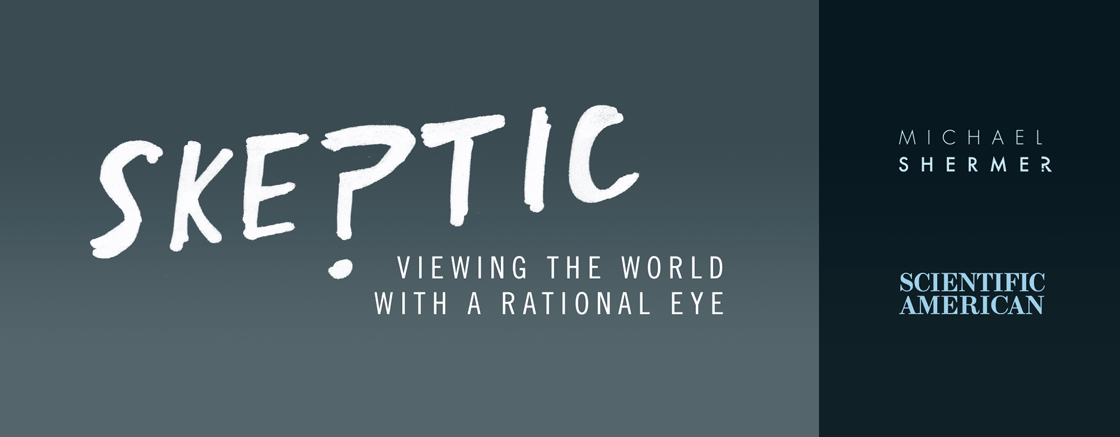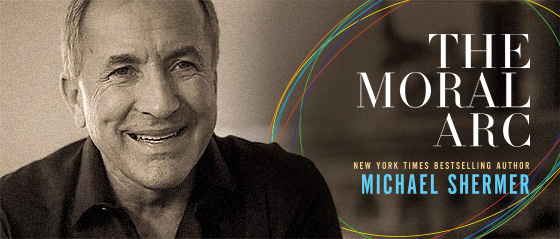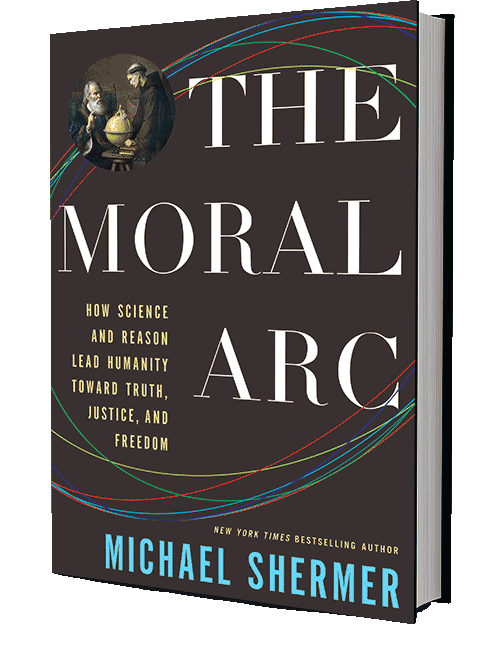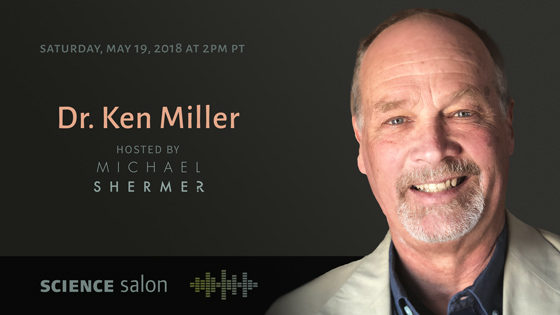In this week’s eSkeptic:
$5.00 SIGNED HARDBACK, 1st EDITION!
On this, the 50th anniversary of the death of Martin Luther King Jr., who famously evoked the arc of the moral universe, we offer a special deal on Dr. Shermer’s book.
“Life’s most persistent and urgent question is, ‘What are you doing for others?’”
Today, Wednesday, April 4, 2018, marks the 50th anniversary of assassination of civil rights activist and Nobel Laureate Martin Luther King Jr. — one of the world’s most dedicated leaders of the march toward moral progress.
In commemoration, Michael Shermer is offering a 1st edition, autographed, hardcover copy of The Moral Arc: How Science and Reason Lead Humanity toward Truth, Justice, and Freedom for only $5.00, plus shipping (while quantities last). In this book about moral progress, Shermer demonstrates, through extensive data and heroic stories, that the arc of the moral universe bends toward truth, justice, and freedom, and that we are living in the most moral period of our species’ history.
Praise for the book
“A thrilling and fascinating book, which could change your view of human history and human destiny.”
“In these cynical times, where right and left foresee disaster and despair (albeit for different reasons), Shermer’s monumental opus, spanning centuries, nations, and cultures, is bound to provoke debate and open minds.”
“Shermer’s thought-provoking, multidisciplinary book will engage anyone who wishes to understand rationalism as a force for morality.”

In this week’s eSkeptic, Harriet Hall, M.D. (aka the SkepDoc) clarifies what we know and don’t know about Alzheimer’s. This column appeared in Skeptic 23.1 (2018).
Hope and Hype for Alzheimer’s
Alzheimer’s sucks! It is a relentless, devastating, cruel disease that destroys patients’ memory and personality, making them no longer the person they used to be. It leaves its victims dependent on caretakers and eventually kills them an average of 4 to 8 years after diagnosis. Ten percent of the population over the age of 65 has it; the incidence is 3% at age 65 and rises to 32% at age 85. As our population ages, millions more will be afflicted, with resultant social and financial costs for society. Already today, 15 million Americans are unpaid caretakers for patients with some form of dementia.
Alzheimer’s can be definitively diagnosed only after death, at autopsy. A substantial percentage of those clinically diagnosed with Alzheimer’s actually have other causes of dementia. As yet, there is no reliable way to make an early diagnosis, and no way to change the course of the disease once it has been diagnosed. Today researchers are developing biomarkers (spinal fluid proteins) and brain imaging methods that improve diagnostic accuracy and may eventually permit early diagnosis before the onset of symptoms. Six drugs have been approved by the FDA for the treatment of Alzheimer’s, but the drugs alleviate only some of the symptoms.1 No drug slows or stops the progression of the disease. And there is nothing that can reverse the damage.
“Awakening from Alzheimer’s”
While this is all very discouraging, scientists are diligently working to understand the disease and find an effective treatment. Others apparently think they needn’t bother. A journalist and singer/songwriter named Peggy Sarlin interviewed “cutting edge doctors” who are allegedly already successful at treating Alzheimer’s, sometimes with dramatic results. She wrote a book and produced an online video series, titled “Awakening from Alzheimer’s,” claiming that Alzheimer’s is for the most part preventable and it can be reversed in 9 out of 10 patients. Wowzers! Wouldn’t it be wonderful if that were true? Sorry, but I’m skeptical. I never rely on videos for my scientific information; they tend to be sensational, one-sided, and agenda-driven. But I gave Sarlin the benefit of the doubt and suffered through her whole series of 14 videos. I was not impressed. In each video, Sarlin interviewed a doctor at length; each had a different approach.
Dr. Mary Newport recommends coconut oil and its extract medium-chain triglyceride (MCT) oil, describing how it miraculously reversed her husband’s symptoms (a “light switch went on in his brain after the very first dose”). She claims to have 400 testimonials from others who tried it, but no controlled scientific studies. Snopes calls her claims “unproven.” On Science-Based Medicine, Steven Novella concluded that the health claims for coconut oil are all unsupported by scientific studies and make little scientific sense.2 The American Heart Association has warned against coconut oil because the evidence shows it increases the risk of heart disease.3 […]

MICHAEL SHERMER’S “SKEPTIC” COLUMN IN SCIENTIFIC AMERICAN
Silent No More: The Rise of the Atheists
In recent years much has been written about the rise of the “nones”—people who check the box for “none” on surveys of religious affiliation. A 2013 Harris Poll of 2,250 American adults, for example, found that 23 percent of all Americans have forsaken religion altogether. A 2015 Pew Research Center poll reported that 34 to 36 percent of millennials (those born after 1980) are nones and corroborated the 23 percent figure, adding that this was a dramatic increase from 2007, when only 16 percent of Americans said they were affiliated with no religion. In raw numbers, this translates to an increase from 36.6 million to 55.8 million nones. Though lagging far behind the 71 percent of Americans who identified as Christian in the Pew poll, they are still a significant voting block, far larger than Jews (4.7 million), Muslims (2.2 million) and Buddhists (1.7 million) combined (8.6 million) and comparable to politically powerful Christian sects such as Evangelical (25.4 percent) and Catholic (20.8 percent).

This shift away from the dominance of any one religion is good for a secular society whose government is structured to discourage catch basins of power from building up and spilling over into people’s private lives. But it is important to note that these nones are not necessarily atheists. Many have moved from mainstream religions into New Age spiritual movements, as evidenced in a 2017 Pew poll that found an increase from 19 percent in 2012 to 27 percent in 2017 of those who reported being “spiritual but not religious.” Among this cohort, only 37 percent described their religious identity as atheist, agnostic or “nothing in particular.”
Even among atheists and agnostics, belief in things usually associated with religious faith can worm its way through fissures in the materialist dam. A 2014 survey conducted by the Austin Institute for the Study of Family and Culture on 15,738 Americans, for example, found that of the 13.2 percent who called themselves atheist or agnostic, 32 percent answered in the affirmative to the question “Do you think there is life, or some sort of conscious existence, after death?” Huh? Even more incongruent, 6 percent of these atheists and agnostics also said that they believed in the bodily resurrection of the dead. You know, like Jesus. […]












